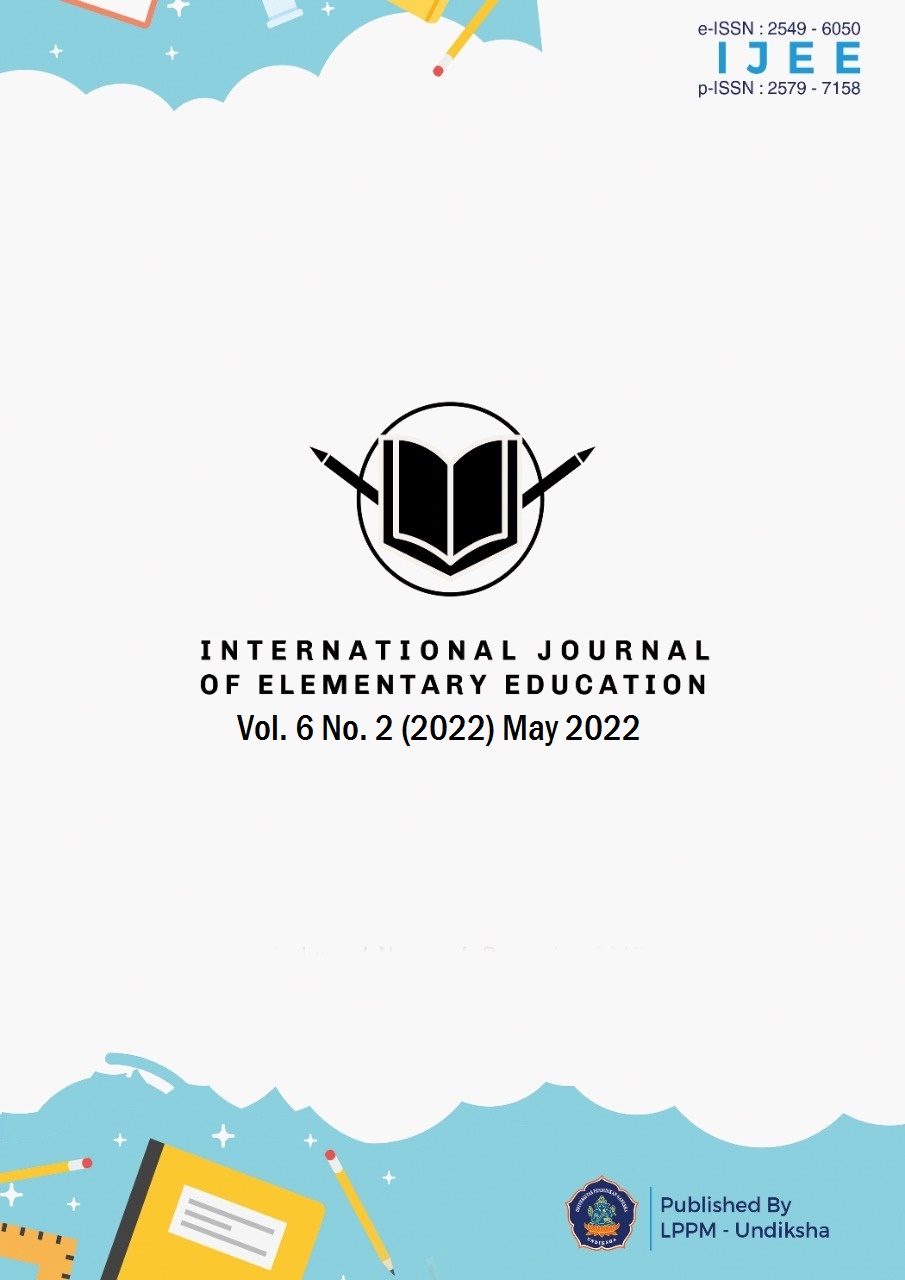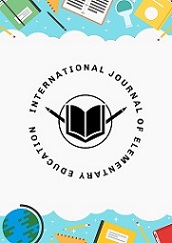Teacher's Perspective: Implementation of Online Learning during the Covid-19 Pandemic
DOI:
https://doi.org/10.23887/ijee.v6i2.46598Keywords:
Teacher Perspective, Online Learning, Covid-19Abstract
The Covid-19 pandemic has caused a major transformation in various fields of life. One of them is the transformation of face-to-face learning into online learning. This study aims to analyze the online learning process and the supporting and inhibiting factors for teachers in carrying out online learning during the Covid-19 pandemic. This research uses a qualitative descriptive research method. The subjects used in this study were elementary school fifth-grade teachers. Data collection techniques used in this study were open questionnaires, semi-structured interviews, documentation, and field notes. Data analysis was carried out qualitatively through a reduction and verification process. The results and discussion of this study indicate that online learning is less effective for teachers, especially for learning at the elementary school level. This is because learning carried out online makes teachers feel less than optimal in providing learning material so that the material is incomplete. In addition, using learning media in online learning is also not optimal. Based on the results of this research, further studies need to be conducted to evaluate the implementation of online learning in elementary schools to obtain the right solution to deal with the problems that occur.
References
Agustina, M., Azizah, E. N., & Koesmadi, D. P. (2021). Pengaruh Pemberian Reward Animasi terhadap Motivasi Belajar Anak Usia Dini selama Pembelajaran Daring. Jurnal Obsesi : Jurnal Pendidikan Anak Usia Dini, 6(1), 353 – 361. https://doi.org/10.31004/obsesi.v6i1.1331.
Asrul, & Hardianto, E. (2020). Kendala Siswa Dalam Proses Pembelajaran Daring Selama Pandemi Covid-19 Di SMP N Satap 1 Ladongi. Al Asma : Journal of Islamic Education, 2(1), 1.
Brom, C., Stárková, T., & D’Mello, S. K. (2018). How effective is emotional design? A meta-analysis on facial anthropomorphisms and pleasant colors during multimedia learning. Educational Research Review, 25, 100–119. https://doi.org/10.1016/j.edurev.2018.09.004.
Cheng, A. Y. N., & Szeto, E. (2016). Teacher leadership development and principal facilitation: Novice teachers’ perspectives. Teaching and Teacher Education, 58, 140–148. https://doi.org/10.1016/j.tate.2016.05.003.
Daheri, M., Juliana, J., Deriwanto, D., & Amda, A. D. (2020). Efektifitas WhatsApp sebagai Media Belajar Daring. Jurnal Basicedu, 4(4), 775–783. https://doi.org/10.31004/basicedu.v4i4.445.
Darmalaksana, W., Hambali, R. Y. A., Masrur, A., & Muhlas. (2020). Analisis Pembelajaran Online Masa WFH Pandemic Covid-19 sebagai Tantangan Pemimpin Digital Abad 21. Karya Tulis Ilmiah (KTI) Masa Work From Home (WFH) Covid-19 UIN Sunan Gunung Djati Bandung Tahun 2020, 1(1), 1–12. http://digilib.uinsgd.ac.id/id/eprint/30434.
Dewantara, J. A., & Nurgiansah, T. H. (2020). Efektivitas Pembelajaran Daring di Masa Pandemi COVID 19 Bagi Mahasiswa Universitas PGRI Yogyakarta. Jurnal Basicedu, 5(1), 367 – 375. https://doi.org/10.31004/basicedu.v5i1.669.
Fauzia, N. L. U., & Kelana, J. B. (2021). Natural Science Problem Solving in Elementary School Students Using the Project Based Learning (PjBL) Model. Jurnal Ilmiah Sekolah Dasar, 4(4), 596–603. https://doi.org/10.23887/jisd.v4i4.28377.
Firman, F., & Rahayu, S. (2020). Pembelajaran Online di Tengah Pandemi Covid-19. Indonesian Journal of Educational Science (IJES), 2(2), 81–89. https://doi.org/10.31605/ijes.v2i2.659.
Fitriani, Y. (2020). Analisa Pemanfaatan Learning Management System (Lms) Sebagai Media Pembelajaran Online Selama Pandemi Covid-19. Journal of Information System, Informatics and Computing, 4(2), 1. https://doi.org/10.52362/jisicom.v4i2.312.
Garbe, A., Ogurlu, U., Logan, N., & Cook, P. (2020). Parents’ Experiences with Remote Education during COVID-19 School Closures. American Journal of Qualitative Research, 4(3), 45–65. https://doi.org/10.29333/ajqr/8471.
Harahap, S. A., Dimyati, D., & Purwanta, E. (2021). Problematika Pembelajaran Daring dan Luring Anak Usia Dini bagi Guru dan Orang tua di Masa Pandemi Covid 19. Jurnal Obsesi : Jurnal Pendidikan Anak Usia Dini, 5(2), 1825–1836. https://doi.org/10.31004/obsesi.v5i2.1013.
Kim, K. (2011). Changes In Student Motivation During Online Learning. Educational Computing Research, 44(1), 1–23. https://doi.org/10.2190/EC.44.1.a.
Knoop-van Campen, C. A. N., Segers, E., & Verhoeven, L. (2020). Effects of audio support on multimedia learning processes and outcomes in students with dyslexia. Computers and Education, 150(February), 103858. https://doi.org/10.1016/j.compedu.2020.103858.
Latifah, N., & Supena, A. (2021). Analisis Attention Siswa Sekolah Dasar Dalam Pembelajaran Jarak Jauh di Masa Pandemi Covid-19. Jurnal Basicedu, 5(3), 1175–1182. https://doi.org/10.31004/basicedu.v5i3.887.
Lau, L. L., Hung, N., Go, D. J., Ferma, J., Choi, M., Dodd, W., & Wei, X. (2020). Knowledge, attitudes and practices of COVID-19 among income-poor households in the Philippines: A cross-sectional study. Journal of Global Health, 10(1), 1–11. https://doi.org/10.7189/JOGH.10.011007.
Malyana, A. (2020). Pelaksanaan Pembelajaran Daring Dan Luring Dengan Metode Bimbingan Berkelanjutan Pada Guru Sekolah Dasar Di Teluk Betung Utara Bandar Lampung. Pedagogia: Jurnal Ilmiah Pendidikan Dasar Indonesia, 2(1), 67–76. https://doi.org/10.52217/pedagogia.v2i1.640.
Mansyur, A. R. (2020). Dampak COVID-19 Terhadap Dinamika Pembelajaran Di Indonesia. Education and Learning Journal, 1(2), 113. https://doi.org/10.33096/eljour.v1i2.55.
Margunayasa, I. G., Dantes, N., Marhaeni, A. I. N., & Suastra, I. W. (2021). Reducing Misconceptions of Elementary School Students Through Guided Inquiry Learning. Jurnal Pendidikan Guru Sekolah Dasar, 5(4), 729–736. https://doi.org/10.23887/jisd.v5i4.40388.
Mpungose, C. B. (2021). Lecturers’ reflections on use of Zoom video conferencing technology for e-learning at a South African university in the context of coronavirus. African Identities. https://doi.org/10.1080/14725843.2021.1902268.
Muhammad Fikri, Muhammad Zaki Ananda, N. F. (2021). Kendala Dalam Pembelajaran Jarak Jauh di Masa Pandemi Covid-19 : Sebuah Kajian Kritis. Jurnal Education and Development Institut Pendidikan Tapanuli Selatan, 9(1), 145–148. https://doi.org/10.37081/ed.v9i1.2290.
Önal, N., İbili, E., & Çalışkan, E. (2017). Does Teaching Geometry with Augmented Reality Affect the Technology Acceptance of Elementary School Mathematics Teacher Candidates? Journal of Education and Practice, 8(19), 151–163. https://eric.ed.gov/?id=ED578608.
Ong, A. K., Prasetyo, Y. T., Chuenyindee, T., Young, M. N., Domad, B. T., & Caballes, D. G. (2022). Preference analysis on the online learning attributes among senior high school students during the COVID-19 pandemic: A conjoint analysis approach. Evaluation and Program Planning, 92, 102100. https://doi.org/10.1016/j.evalprogplan.2022.102100.
Paul, R., & Singh, A. (2020). Does early childhood adversities affect physical, cognitive and language development in indian children? Evidence from a panel study. SSM - Population Health, 12(August), 100693. https://doi.org/10.1016/j.ssmph.2020.100693.
Pernantah, P., Rizatunnita, R., Kusnilawati, L., & Handrianto, C. (2022). Implementasi Pembelajaran Tatap Muka (PTM) Terbatas Selama Masa Pandemi Covid-19 di SMA N 1 Kubu. Pedagogi: Jurnal Ilmu Pendidikan, 22(1), 46–52. https://doi.org/10.24036/pedagogi.v22i1.1257.
Prawiyogi, Anggi Giri, D. (2020). Efektifitas Pembelajaran Jarak Jauh Terhadap Pembelajaran Peserta didik di SDIT Purwakarta. JPD: Jurnal Pendidikan Dasar, 1(1), 8. https://doi.org/10.21009/JPD.011.10.
Purwanto, A. (2020). Studi eksplorasi Dampak WFH Terhadap Kinerja Guru. Journal of Education, Psychology and Counseling, 2(1), 92–100. https://ummaspul.e-journal.id/Edupsycouns/article/view/397.
Putri, N. A., M.S, Z., & H, O. S. (2021). Faktor-Faktor Penyebab Peningkatan Nilai Siswa Sekolah Dasar dalam Pembelajaran Jarak Jauh Ppda Masa Pandemi Covid-19. Jurna Basicedu, 5(4), 2164 – 2170. https://doi.org/10.31004/basicedu.v5i4.1171.
Putri, R. D. P., & Suyadi. (2021). Problematika Pembelajaran Daring dalam Penerapan Kurikulum 2013 Tingkat Sekolah Dasar. Jurnal Basicedu, 5(5), 3912–3919. https://doi.org/10.31004/basicedu.v5i5.1442.
Putria, H., Maula, L. H., & Uswatun, D. A. (2020). Analisis Proses pembelajaran Dalam Jaringan (DARING) Masa Pandemi COVID-19 pada Guru Sekolah Dasar. Jurnal Basicedu, 4(4), 861–872. https://doi.org/10.31004/basicedu.v4i4.460.
Rahma, N. A., & Pujiastuti, H. (2021). Efektivitas Pembelajaran Daring Matematika Pada Masa Pandemi Covid-19 Di Kota Cilegon [ The Effectiveness Of Mathematics Online Learning During The Covid-19 Pandemic In Cilegon City ]. JOHME: Journal of Holistic Mathematics Education, 5(1), 1. https://doi.org/10.19166/johme.v5i1.3811.
Rigianti, H. A. (2020). Kendala Pembelajaran Daring Guru Sekolah Dasar Di Kabupaten Banjarnegara. Jurnal Elementary School, 7(2), 297–302. https://doi.org/10.31316/esjurnal.v7i2.768.
Ritonga, A. W., Ritonga, M., Nurdianto, T., Kustati, M., Rehani, R., Lahmi, A., Yasmadi, Y., & Pahri, P. (2020). E-Learning Process of Maharah Qira’ah in Higher Education during the Covid-19 Pandemic. International Journal of Higher Education, 9(6), 227. https://doi.org/10.5430/ijhe.v9n6p227.
Rosyidiana, H. (2021). Problematika Pembelajaran Daring Pada Mata Pelajaran Sains (IPA) Tingkat Dasar Di Masa Pandemi Covid-19. Jurnal Basicedu, 5(4), 1709 – 1716. https://doi.org/10.31004/basicedu.v5i4.948.
Sakti, S. A. (2021). Persepsi Orang Tua Siswa terhadap Pembelajaran Daring pada Masa Pandemi Covid 19 di Yogyakarta. Jurnal Obsesi, 6(1). https://doi.org/10.31004/obsesi.v6i1.804.
Saugi, W. (2020). Implementation of Curriculum Kuttab Al-Fatih on Children at an Early Age. Jurnal Obsesi : Jurnal Pendidikan Anak Usia Dini, 5(1), 70. https://doi.org/10.31004/obsesi.v5i1.510.
Stoica, A. M., & Roco, M. (2013). The Role of the Emotional Intelligence in Kindergarden Children’s Development. Procedia - Social and Behavioral Sciences, 78(1), 150–154. https://doi.org/10.1016/j.sbspro.2013.04.269.
Suarsi, P. D. K., & Wibawa, I. M. C. (2021). The Impact of the COVID-19 Pandemic on Student Learning Motivation. Jurnal Ilmiah Sekolah Dasar, 5(2), 194–201. https://doi.org/10.23887/jisd.v5i2.34418.
Sugiyono. (2019). Metode penelitian kuantitatif dan kualitatif dan R&D. Alfabeta Bandung.
Sumarno. (2020). Adaptasi Sekolah Dalam Mengimplementasikan Pembelajaran Jarak Jauh Pada Masa Pandemi Covid-19. Jurnal Tarbiyah & Ilmu Keguruan (JTIK) Borneo, I(2), 149–162. https://journal.uinsi.ac.id/index.php/JTIKBorneo/article/view/2435.
Süt, H. M., & Öznaçar, B. (2021). Effects of COVID-19 Period on Educational Systems and Institutions. International Journal of Curriculum and Instruction, 13(1), 537–551. https://files.eric.ed.gov/fulltext/EJ1285554.pdf.
Syachtiyani, W. R., & Trisnawati, N. (2021). Analisis Motivasi Belajar Dan Hasil Belajar Siswa Di Masa Pandemi Covid-19. Prima Magistra: Jurnal Ilmiah Kependidikan, 2(1), 90–101. https://doi.org/10.37478/jpm.v2i1.878.
Tang, Y. M., Chen, P. C., Law, K. M. Y., Wu, C. H., Lau, Y. yip, Guan, J., He, D., & Ho, G. T. S. (2021). Comparative analysis of Student’s live online learning readiness during the coronavirus (COVID-19) pandemic in the higher education sector. Computers and Education, 168(April). https://doi.org/10.1016/j.compedu.2021.104211.
Wibawa, K., Santiyadnya, N., & Indrawan, G. (2018). Evaluasi Pelaksanaan Pembelajaran Instalasi Penerangan Listrik Kompetensi Keahlian Tiptl Smk Negeri 3 Singaraja. Jurnal Pendidikan Teknik Elektro Undiksha, 7(1), 10–19. https://doi.org/10.23887/jjpte.v7i1.20216.
Widoretno, S., & Dwiastuti, S. (2019). Improving students’ thinking skill based on class interaction in discovery instructional: A case of lesson study. Jurnal Pendidikan IPA Indonesia, 8(3), 347–353. https://doi.org/10.15294/jpii.v8i3.20003.
Wijayanti, R. M., & Fauziah, P. Y. (2020a). Perspektif dan Peran Orangtua dalam Program PJJ Masa Pandemi Covid-19 di PAUD. Jurnal Obsesi : Jurnal Pendidikan Anak Usia Dini, 5(2), 1304–1312. https://doi.org/10.31004/obsesi.v5i2.768.
Wijayanti, R. M., & Fauziah, P. Y. (2020b). Perspektif dan Peran Orangtua dalam Program PJJ Masa Pandemi Covid-19 di PAUD. Jurnal Obsesi : Jurnal Pendidikan Anak Usia Dini, 5(2), 1304–1312. https://doi.org/10.31004/obsesi.v5i2.768.
Windhiyana, E. (2020). Dampak Covid-19 Terhadap Kegiatan Pembelajaran Online Di Perguruan Tinggi Kristen Di Indonesia. Perspektif Ilmu Pendidikan, 34(1), 1–8. https://doi.org/10.21009/pip.341.1.
Wulandari, H., & Purwanta, E. (2021). Pendidikan Anak Usia Dini Pencapaian Perkembangan Anak Usia Dini di TK selama Pembelajaran Daring saat Pandemi Covid-19. Jurnal Obsesi : Jurnal Pendidikan Anak Usia Dini, 5(1), 452–462. https://doi.org/10.31004/obsesi.v5i1.626.
Yulianingsih, W., Suhanadji, S., Nugroho, R., & Mustakim, M. (2020). Keterlibatan Orangtua dalam Pendampingan Belajar Anak selama Masa Pandemi Covid-19. Jurnal Obsesi : Jurnal Pendidikan Anak Usia Dini, 5(2), 1138–1150. https://doi.org/10.31004/obsesi.v5i2.740.
Yunitasari, R., & Hanifah, U. (2020). Pengaruh Pembelajaran Daring terhadap Minat Belajar Siswa pada Masa COVID 19. Edukatif : Jurnal Ilmu Pendidikan, 2(3), 232–243. https://doi.org/10.31004/edukatif.v2i3.142.
Zakaria, P., Nurwan, N., & Silalahi, F. D. (2021). Deskripsi Kemampuan Berpikir Kritis Siswa Melalui Pembelajaran Daring Pada Materi Segi Empat. Euler : Jurnal Ilmiah Matematika, Sains Dan Teknologi, 9(1), 32–39. https://doi.org/10.34312/euler.v9i1.10539.
Downloads
Published
How to Cite
Issue
Section
License
Copyright (c) 2022 Made Padmarani Sudewiputri

This work is licensed under a Creative Commons Attribution-ShareAlike 4.0 International License.
Authors who publish with the International Journal of Elementary Education agree to the following terms:
- Authors retain copyright and grant the journal the right of first publication with the work simultaneously licensed under a Creative Commons Attribution License (CC BY-SA 4.0) that allows others to share the work with an acknowledgment of the work's authorship and initial publication in this journal.
- Authors are able to enter into separate, additional contractual arrangements for the non-exclusive distribution of the journal's published version of the work (e.g., post it to an institutional repository or publish it in a book), with an acknowledgment of its initial publication in this journal.
- Authors are permitted and encouraged to post their work online (e.g., in institutional repositories or on their website) prior to and during the submission process, as it can lead to productive exchanges, as well as earlier and greater citation of published work. (See The Effect of Open Access)










